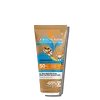Sunozon Med Sonnenfluid LSF 50 Versus La Roche-Posay Anthelios Dermo-Pediatrics Wet Skin Lotion SPF 50+
What's inside
What's inside
 Key Ingredients
Key Ingredients

 Benefits
Benefits

 Concerns
Concerns

No concerns
 Ingredients Side-by-side
Ingredients Side-by-side

Water
Skin ConditioningGlycerin
HumectantC12-15 Alkyl Benzoate
AntimicrobialDiethylamino Hydroxybenzoyl Hexyl Benzoate
UV FilterDiisopropyl Adipate
EmollientEthylhexyl Triazone
UV AbsorberPropanediol Dicaprylate/Caprate
EmollientBis-Ethylhexyloxyphenol Methoxyphenyl Triazine
Skin ConditioningPotassium Cetyl Phosphate
EmulsifyingMyristyl Alcohol
EmollientPhenoxyethanol
PreservativeXanthan Gum
EmulsifyingPhenylbenzimidazole Sulfonic Acid
UV AbsorberTocopheryl Acetate
AntioxidantPotassium Hydroxide
BufferingSclerotium Gum
Emulsion StabilisingAcacia Senegal Gum
MaskingCaprylhydroxamic Acid
Water, Glycerin, C12-15 Alkyl Benzoate, Diethylamino Hydroxybenzoyl Hexyl Benzoate, Diisopropyl Adipate, Ethylhexyl Triazone, Propanediol Dicaprylate/Caprate, Bis-Ethylhexyloxyphenol Methoxyphenyl Triazine, Potassium Cetyl Phosphate, Myristyl Alcohol, Phenoxyethanol, Xanthan Gum, Phenylbenzimidazole Sulfonic Acid, Tocopheryl Acetate, Potassium Hydroxide, Sclerotium Gum, Acacia Senegal Gum, Caprylhydroxamic Acid
Water
Skin ConditioningHomosalate
Skin ConditioningDrometrizole Trisiloxane
UV AbsorberEthylhexyl Salicylate
UV AbsorberBis-Ethylhexyloxyphenol Methoxyphenyl Triazine
Skin ConditioningEthylhexyl Triazone
UV AbsorberGlycine
BufferingButyl Methoxydibenzoylmethane
UV AbsorberIsohexadecane
EmollientAlcohol Denat.
AntimicrobialPropanediol
SolventDicaprylyl Ether
EmollientStyrene/Acrylates Copolymer
Dimethicone
EmollientAcrylates/Dimethicone Copolymer
Skin ConditioningP-Anisic Acid
MaskingAscorbyl Palmitate
AntioxidantCarbomer
Emulsion StabilisingDisodium EDTA
Glyceryl Oleate
EmollientHydrogenated Palm Glycerides Citrate
EmollientLecithin
EmollientNylon-12
PEG-8 Laurate
EmulsifyingPhenoxyethanol
PreservativeTocopherol
AntioxidantTriethanolamine
BufferingWater, Homosalate, Drometrizole Trisiloxane, Ethylhexyl Salicylate, Bis-Ethylhexyloxyphenol Methoxyphenyl Triazine, Ethylhexyl Triazone, Glycine, Butyl Methoxydibenzoylmethane, Isohexadecane, Alcohol Denat., Propanediol, Dicaprylyl Ether, Styrene/Acrylates Copolymer, Dimethicone, Acrylates/Dimethicone Copolymer, P-Anisic Acid, Ascorbyl Palmitate, Carbomer, Disodium EDTA, Glyceryl Oleate, Hydrogenated Palm Glycerides Citrate, Lecithin, Nylon-12, PEG-8 Laurate, Phenoxyethanol, Tocopherol, Triethanolamine
 Reviews
Reviews

Ingredients Explained
These ingredients are found in both products.
Ingredients higher up in an ingredient list are typically present in a larger amount.
You might know this ingredient as Tinosorb S or Bemotrizinol. It is a UV filter that covers both UVA and UVB rays.
This ingredient has two peak UV absorption peaks ( 310 and 340 nm) and is able to absorb both UV-A and UV-B rays. This ingredient works by preventing UV rays from reaching and damaging your skin.
On top of that - it is highly photostable and helps prevent the photodegration of other sunscreen ingredients such as avobenzone.
Tinosorb S is allowed in the EU, Australia, and Asia. It is close to being approved by the FDA and we'll hopefully get this ingredient in the U.S. by late 2025.
Fun fact: Tinosorb S is the most effective UV absorber at maximum concentration (measured by SPF) permitted in the EU.
This ingredient is oil-soluble, so your oil-cleansers will take this right off at night.
Learn more about Bis-Ethylhexyloxyphenol Methoxyphenyl TriazineEthylhexyl Triazone is a modern chemical sunscreen that protects from UV-B radiation.
It is the most effective of existing UV-B filters, as it provides the highest level of photo-stable absorption. It protects from the entire UV-B range (280 to 320nm), with it's highest level of protection at 314nm.
Ethylhexyl Triazone is oil soluble, oderless and colorless, which mean it is able to be incorporated into a variety of different formulations.
It is not currently available within the United States due to slow changing FDA regulations. Outside of the US, it is used in formulations at concentrations up to 5%.
Learn more about Ethylhexyl TriazonePhenoxyethanol is a preservative that has germicide, antimicrobial, and aromatic properties. Studies show that phenoxyethanol can prevent microbial growth. By itself, it has a scent that is similar to that of a rose.
It's often used in formulations along with Caprylyl Glycol to preserve the shelf life of products.
Water. It's the most common cosmetic ingredient of all. You'll usually see it at the top of ingredient lists, meaning that it makes up the largest part of the product.
So why is it so popular? Water most often acts as a solvent - this means that it helps dissolve other ingredients into the formulation.
You'll also recognize water as that liquid we all need to stay alive. If you see this, drink a glass of water. Stay hydrated!
Learn more about Water